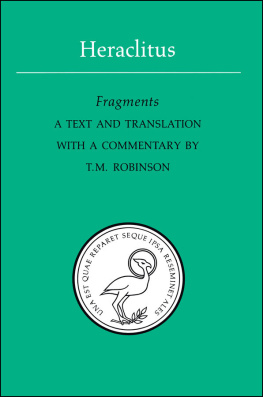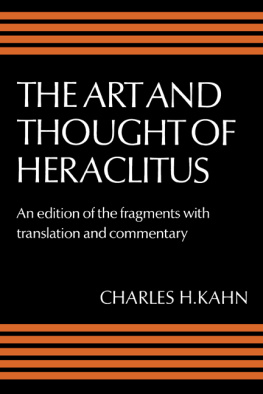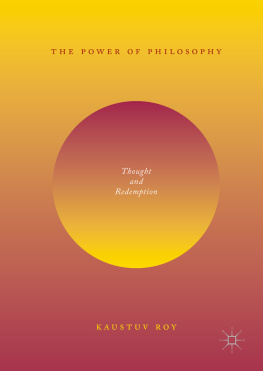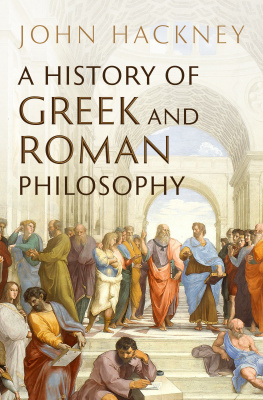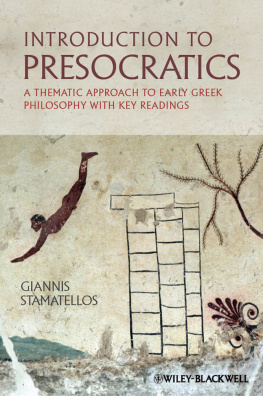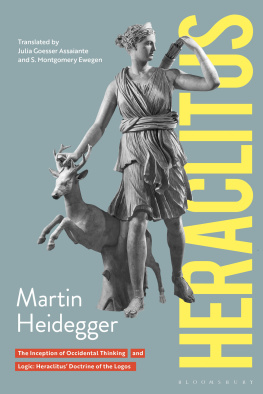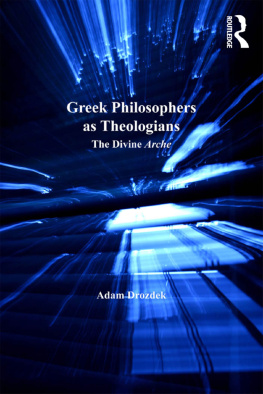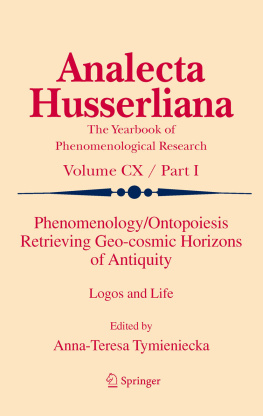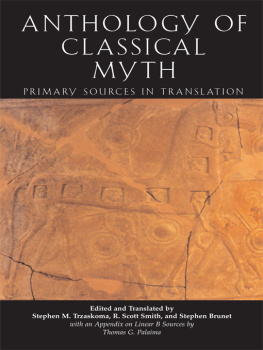Heraclitus
FRAGMENTS:
A TEXT AND TRANSLATION WITH A COMMENTARY
by T.M. Robinson
This volume provides a Greek text of Heraclitus with a new, facing-page translation, together with a commentary discussing the philosophical issues raised by Heraclitus work and outlining the main problems of interpretation. The volume also contains an English translation of substantial material from the ancient testimonia concerning Heraclitus life and teaching, and offers selective bibliographical guidance.
While much of the commentary follows lines of interpretation that have won general acceptance, it differs from many in its claim that the logos of which Heraclitus speaks in fragments 1, 2, and 50 means, essentially, statement. This statement, uttered in words by Heraclitus, reflects that statement everlastingly uttered by the cosmos itself, which descriptively tells of how things are and prescriptively lays down patterns of cosmic activity that serve as the basis for human laws (fragment 114).
T.M. ROBINSON is Professor of Philosophy at the University of Toronto.
PHOENIX
Journal of the Classical Association of Canada Revue de la Socit canadienne des tudes classiques Supplementary Volume XXII / Phoenix Pre-Socratics Volume II
Tome supplmentaire XXII / Les Pr-Socratiques Phoenix tome II
Phoenix Pre-Socratics / Les Pr-Socratiques Phoenix
General Editors / Rdacteurs en chef
David Gallop Trent University
T.M. ROBINSON University of Toronto
Heraclitus
FRAGMENTS
A TEXT AND TRANSLATION
WITH A COMMENTARY BY
T.M. ROBINSON

University of Toronto Press 1987
Toronto Buffalo London
Printed in Canada
Paperback edition 1991
ISBN 0-8020-6913-4
Reprinted 1996,1999, 2003

Printed on acid-free paper
Canadian Cataloguing in Publication Data
Heraclitus, of Ephesus.
Heraclitus: fragments
(Phoenix. Supplementary volume; 22 = Phoenix.
Tome supplementary, ISSN 0079-1784; 22)
(Phoenix pre-Socratics; v. 2 =
Les Pr-Socratiques Phoenix; t. 2)
Greek text with English translation and commentary.
Bibliography: p.
Includes index.
ISBN 0-8020-6913-4
1. Philosophy, Ancient.
I. Robinson, T.M. (Thomas More), 1936
II. Title.
III. Series: Phoenix.
Supplementary volume (Toronto, Ont.); 22.
IV. Series: Phoenix pre-Socratics (Toronto, Ont.); V. 2.
B220.E5R62 1987 182.4 C87-093305-1
This book has been published with the help of a grant from the Canadian Federation for the Humanities, using money provided by the Social Sciences and Humanities Research Council of Canada.
Emily Evangeline Robinson
Alban Bainbridge Robinson
ad memoriam
CONTENTS
PREFACE
This book has been written mainly for those with an interest in Greek philosophy as philosophy. It contains, along with the Greek text of the fragments of Heraclitus writings, a translation of the fragments and testimonia printed by Diels-Kranz (Die Fragmente der Vorsokratiker, 6th edition [1951]), omitting testimonia 3b (the Greek text of which D-K do not provide), 14a (the relevance of which is unclear), and 2. The translation of the fragments is a new one; that of the testimonia is new where none previously existed but in other respects deviates from already published translations (usually in the Loeb series) only when it seemed necessary. I have also tried to write a commentary on the fragments (but not, except incidentally, on the testimonia, which could fill a volume by itself) which forgoes the temptation to pursue in as much detail as others have pursued them matters of philological, historical, and cultural interest, unless they are seen to be clearly germane to an understanding of Heraclitus central beliefs as a philosopher. This means that a number of topics like the controverted details of his meteorology that have occupied a great deal of space in earlier accounts of Heraclitus receive minimal treatment. For the rest, I am of course indebted to the writings of many outstanding Heraclitean scholars, not least Diels, Reinhardt, Frnkel, Snell, Gigon, Kirk, Marcovich, and, most recently, Kahn. My own commentary, specialists will notice, is particularly indebted both to Kirk and to Kahn, and a couple of major heresies I draw gratefully from Kahns subtle and stimulating study in particular, that is, that Heraclitus believed in four elements not three, and also in a doctrine of periodic conflagration (ecpyrsis) of the universe. A further heresy that Heraclitus had no doctrine of logos I draw from West.
After much thought I have also made the decision not to confuse readers with yet another ordering of the fragments. The order followed, therefore, is that of the Diels-Kranz edition (ie, an alphabetic one); those further interested in finding out what I take to be a number of natural groupings of the fragments may wish to scan my tentative reconstruction of Heraclitus thought (Summary, pp 181-91), a reconstruction which of course makes no claims to knowledge of the order in which the fragments appeared in Heraclitus own book, and is in no way contingent upon any particular ordering.
A few of the fragments found in D-K (particularly a number stemming from Marcus Aurelius) seem so clearly a particular authors own vague summary or reminiscence of some Heraclitean saying that, along with the great majority of commentators, I have simply omitted them. (These are fragments 13a, 68-71, 73, 81b, and 122.) Others, while doubtfully ascribable to Heraclitus in their present form, but catching, it seems to me, something of the spirit of Heraclitus philosophy, I have signalled by square brackets. Others again, including one or two famous ones, that seem to me arguably not Heraclitean at all, though frequently ascribed to him, I have signalled with a question-mark.
The text that I have followed is basically that found in the edition of M. Marcovich, Heraclitus: The Greek Text with a Short Commentary (Merida 1967), though on a number of important points (eg, the text of fragment 51) I have followed others. My greatest single debt in this area is none the less still to Marcovich, whose collection of texts and testimonia remains an invaluable source-book for all students of Heraclitus.
I am particularly indebted to the publishers and the Loeb Classical Library for permission to reprint, with some changes of my own, the translation by R.D. Hicks of the Life of Heraclitus in Diogenes Laertius, Lives of Eminent Philosophers, vol. 2, Cambridge, Massachusetts: Harvard University Press 1959; and the translation by R.G. Bury of Sextus Empiricus, Against the Mathematicians, 7.126-34, ibid, 1935. I should like at the same time to express my thanks to the following for allowing me to reprint, in slightly revised form, material that was originally published by them: the editor of the Canadian Journal of Philosophy for a critical notice of Charles H. Kahn, The Art and Thought of Heraclitus (13 [1983], 607-21); Scholars Press for Heraclitus: Some Soundings, in Greek Poetry and Philosophy: Studies in Honour of Leonard Woodbury, edited by Douglas E. Gerber (1984), 229- 40; and the editor of The Monist for Heraclitus on Soul (69 [1986], 305-14).
As far as the actual production of the volume is concerned, I owe a special debt of thanks to the Editor and staff of
Next page
